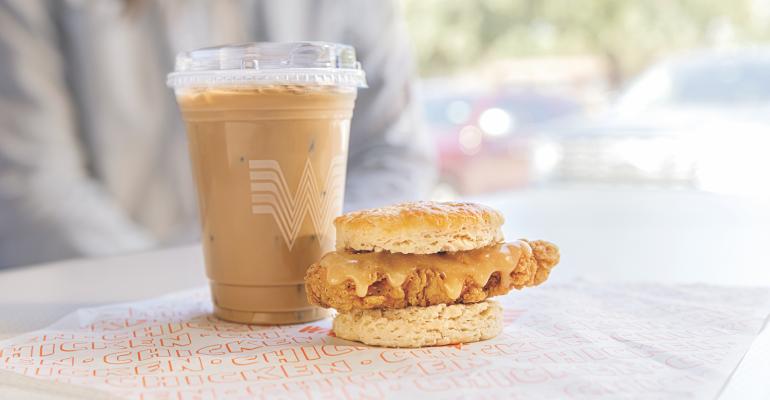Whataburger is upgrading its coffee offerings with new hot and iced coffee, a new sweet cream, and a limited-time shake to promote the change. They’re being rolled out on May 7.
The same blend of Arabica coffee beans from Colombia, Nicaragua, Guatemala, and Honduras are being used for both hot and iced coffees, but the roast is different.
“Our hot coffee is a true medium roast, and the iced coffee is a true dark roast,” said Alexander Ivannikov, the San Antonio-based chain’s executive vice president and chief administrative officer.
He added that Whataburger has long had good coffee, “but consumer preferences and the level of sophistication and what people expect from their coffee today versus 10 or 20 years ago, has evolved significantly.”
The iced coffee will be available with caramel, vanilla, or chocolate syrup added, as well as unflavored. The syrups, along with the new vanilla flavored sweet cream, will be added to order, allowing guests to customize their drinks.
The LTO shake is a caramel latte flavor, made from the chain’s vanilla shake base with a caffeinated flavored syrup added.
Prices will vary by market, but in Whataburger's home market of San Antonio, Hot Coffee ranges from $1.69 to $2.59 and iced will be $3.69-$3.99 depending on size.
Shakes start at around $3.
Austin Crocker, the 1,014-unit chain’s vice president of strategy, innovation, and restaurant services, said he and his team developed the coffee blend to pair well with both sweet and savory foods.
“We offer a fantastic menu at breakfast, and some of our customers come to us for savory food items and some come for sweet items, such as our cinnamon roll, and we wanted to make sure that our coffee platform and taste profile was complementary to both,” he said.
Ivannikov said they needed a blend that they could customize but that wasn’t so rare that it wouldn’t be available year-round.
“You can pick a great coffee that’s only available in like three sacks a year, but we needed something that wasn’t super-exotic and available only in very small quantities, but we also wanted something that we could customize and get all the right characteristics and control the process,” he said.
“We started with small local roasters, just to get a feel for the industry and the current availability of the beans, and then we had to find someone who could execute for us at a significant scale.”
Crocker said further coffee innovation over the next couple of years would likely come in the form of new flavored syrups.
Contact Bret Thorn at [email protected]





